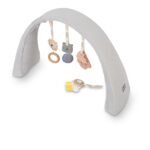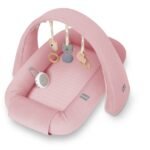Soutenir l'immunité chez les enfants de plus d'un an - conseils pratiques pour les parents

Soutenir l'immunité chez les enfants de plus d'un an - conseils pratiques pour les parents
Prenez soin de la santé de votre tout-petit pour profiter pleinement de la vie sans infections inutiles ! Le renforcement de l'immunité des enfants après l'âge d'un an est un sujet qui intéresse certainement de nombreux parents. Les maladies fréquentes pendant la période préscolaire peuvent être gênantes, mais il existe de nombreuses façons de renforcer le système immunitaire de votre tout-petit.
Alimentation variée et équilibrée
Une alimentation saine est le fondement d'une immunité forte. Il convient de rappeler qu'un régime alimentaire approprié apporte à votre enfant tous les nutriments nécessaires, tels que les vitamines, les minéraux, les protéines, les graisses et les glucides.
Vitamines et minéraux : L'alimentation de l'enfant doit comprendre des produits riches en vitamines A, C et D, qui soutiennent le système immunitaire. La vitamine A se trouve dans les carottes, le potiron et les épinards, la vitamine C dans les agrumes, les poivrons et les fraises, et la vitamine D dans les poissons gras, les œufs et les produits enrichis.
Acides gras oméga-3Les oméga-3, en particulier le DHA (acide docosahexaénoïque), jouent un rôle clé dans le développement du système nerveux de l'enfant, ainsi que dans le soutien de l'immunité. Les oméga-3 ont des propriétés anti-inflammatoires qui aident l'organisme à lutter contre les infections. Les poissons gras tels que le saumon, le maquereau et les sardines sont de riches sources de ces acides gras. Si l'enfant ne mange pas de poisson, il vaut la peine d'envisager une supplémentation en DHA, en particulier pendant les périodes de susceptibilité accrue aux infections. Des études montrent qu'un apport adéquat en DHA favorise le fonctionnement du système immunitaire et qu'une carence en DHA peut entraîner une diminution des capacités cognitives et une sensibilité accrue aux infections.
Supplémentation en zinc pendant les périodes infectieuses
Le zinc est l'un des minéraux les plus importants pour le développement et le fonctionnement du système immunitaire. Il est essentiel à la production de globules blancs, qui sont chargés de combattre les agents pathogènes. Une carence en zinc peut entraîner une sensibilité accrue aux infections et un ralentissement de la cicatrisation des plaies. Pendant les périodes où le risque d'infection est plus élevé, en particulier en automne et en hiver, il convient de veiller à la teneur en zinc de l'alimentation de l'enfant. Les bonnes sources de zinc sont la viande, le poisson, les œufs et les produits céréaliers complets. En cas de symptômes de carence (comme des rhumes fréquents ou une mauvaise cicatrisation des plaies), il convient de consulter un spécialiste et d'envisager une supplémentation.
Probiotiques et microflore intestinale saine
L'état des intestins a un impact considérable sur l'immunité. Une microflore intestinale saine agit comme une barrière protectrice contre les micro-organismes et soutient le fonctionnement du système immunitaire.
Probiotiques naturels : Le kéfir, le yaourt naturel et les préparations probiotiques spécialement conçues à cet effet peuvent contribuer au maintien d'une flore bactérienne adéquate dans les intestins de l'enfant. Il convient toutefois de rappeler que les probiotiques doivent être choisis individuellement, de préférence après avoir consulté un pédiatre.
Supplémentation en vitamine D
La vitamine D joue un rôle essentiel dans l'immunité des tout-petits. Malheureusement, sa synthèse cutanée peut être insuffisante, surtout en automne et en hiver, lorsque le soleil se fait rare. Les experts recommandent une supplémentation en vitamine D chez les enfants âgés de 1 à 3 ans, surtout pendant les mois de septembre à avril. La dose doit être de 15 μg par jour, ce qui permettra d'assurer des niveaux adéquats de cette vitamine.
Activité physique régulière
L'exercice au grand air renforce l'organisme et lui permet de lutter plus efficacement contre les infections. Les promenades quotidiennes, la course à pied ou les jeux dans la cour de récréation influencent le développement moteur, mais renforcent également l'immunité de l'enfant.
Sommeil adéquat et régénération
Les enfants âgés de 1 à 3 ans ont besoin d'environ 12 à 14 heures de sommeil par nuit, y compris les siestes pendant la journée. Le sommeil permet à l'organisme de se régénérer et de renforcer l'immunité. Un sommeil insuffisant peut affaiblir les défenses de l'organisme.
Le bon choix de sac de couchage est essentiel pour maintenir la température corporelle optimale de l'enfant, ce qui affecte directement son immunité. Surchauffer votre enfant pendant son sommeil peut affaiblir son système immunitaire et augmenter le risque d'infection. Il convient donc de choisir sacs de couchage de bonne épaisseurLe système de chauffage est un système de chauffage à air pulsé, adapté à la saison, qui assure un confort thermique sans risque de surchauffe.
Pratiquer une bonne hygiène, mais avec modération
Bien que l'hygiène soit importante, un environnement trop stérile peut limiter l'exposition de votre enfant aux microbes qui favorisent le développement immunitaire. Il est essentiel de se laver régulièrement les mains, mais il n'est pas nécessaire d'abuser des désinfectants au quotidien.
Soutenir l'immunité d'un enfant est un processus qui nécessite un équilibre - une alimentation équilibrée, une activité adéquate, la régénération et le maintien d'une microflore intestinale saine. Veillez à des promenades régulières, à de bonnes habitudes alimentaires et à un sommeil suffisant pour que votre enfant puisse jouir d'une bonne santé au quotidien !
Emilia Adamczyk

 Arche de jeu réglable
Arche de jeu réglable Arche de jeu réglable avec module sonore
Arche de jeu réglable avec module sonore Nid de bébé modulaire 2 en 1 avec côtés amovibles
Nid de bébé modulaire 2 en 1 avec côtés amovibles Nid de bébé modulaire 3 en 1 avec arche de jeu
Nid de bébé modulaire 3 en 1 avec arche de jeu Nid de bébé modulaire 3 en 1 avec sons
Nid de bébé modulaire 3 en 1 avec sons Nid d'enfant modulable 4 en 1
Nid d'enfant modulable 4 en 1 Sac de couchage Grow Up
Sac de couchage Grow Up Sac de couchage NewBorn
Sac de couchage NewBorn Sac de couchage en mousseline
Sac de couchage en mousseline Sacs de couchage avec jambes
Sacs de couchage avec jambes Sac de couchage avec manches amovibles
Sac de couchage avec manches amovibles L'emmaillotement de la première étape
L'emmaillotement de la première étape Emmaillotage de deuxième étape
Emmaillotage de deuxième étape Enveloppes d'emmaillotage
Enveloppes d'emmaillotage Coussin anti-sueur pour siège auto / porte-bébé 0+
Coussin anti-sueur pour siège auto / porte-bébé 0+ Coussin anti-sueur respirant pour siège auto / poussette 2+
Coussin anti-sueur respirant pour siège auto / poussette 2+ Couverture en mousseline Lightwear pour siège de voiture
Couverture en mousseline Lightwear pour siège de voiture Couverture d'hiver pour siège de voiture
Couverture d'hiver pour siège de voiture Oreiller anti-chocs Butterfly
Oreiller anti-chocs Butterfly Oreiller de modelage de la tête
Oreiller de modelage de la tête Oreiller Teddy Bear en mousseline
Oreiller Teddy Bear en mousseline Couverture en bambou
Couverture en bambou Couverture en bambou ultra douce
Couverture en bambou ultra douce Tapis de jeu
Tapis de jeu Matelas à langer portable
Matelas à langer portable Nacelle Anti-Sweat Carrycot/Gondola Pad
Nacelle Anti-Sweat Carrycot/Gondola Pad Tour de lit modulaire
Tour de lit modulaire Mascottes
Mascottes Sac de couchage NewBorn
Sac de couchage NewBorn Sac de couchage avec manches amovibles
Sac de couchage avec manches amovibles Enveloppes d'emmaillotage
Enveloppes d'emmaillotage Tour de lit modulaire
Tour de lit modulaire